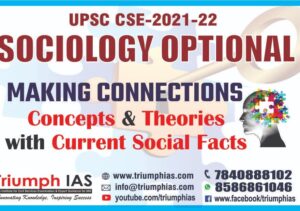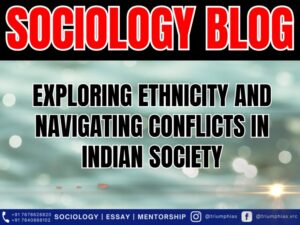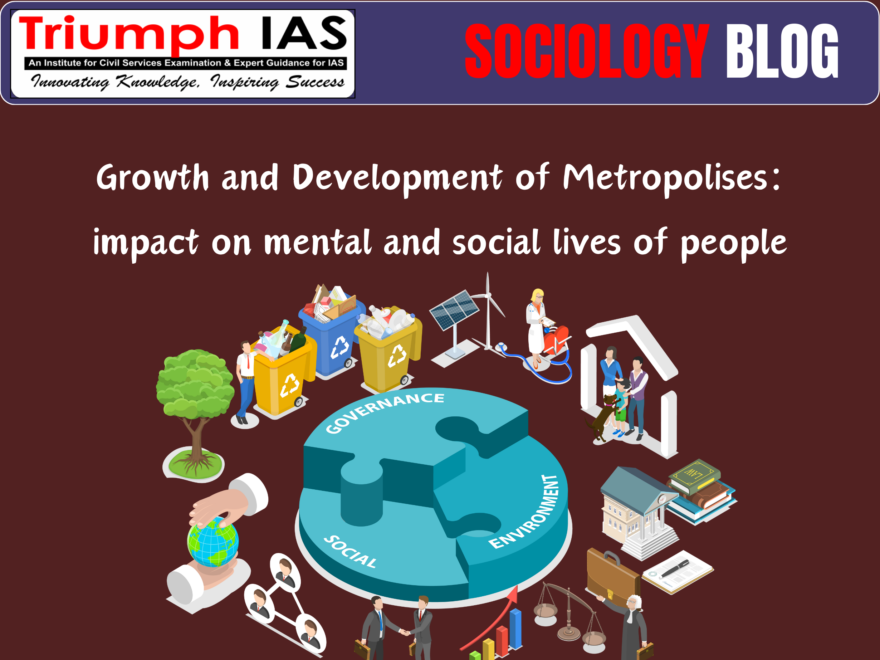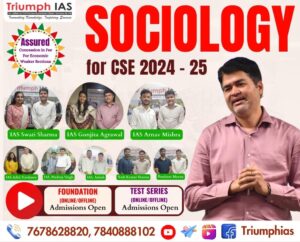Growth and Development of Metropolises: impact on mental and social lives of people
Relevant for Sociology Optional for Civil Service Examination.
Sociology Paper -2
Unit 3 : Social Change in India : Industrialization and Urbanisation in India
Growth and Development of Metropolises: impact on mental and social lives of people
The growth and development of metropolises in India have significant impacts on the mental and social lives of people. Metropolises are characterized by rapid urbanization, increased economic opportunities, improved infrastructure, and diverse social interactions.
Multidimensional Analysis of Growth of Metropolis on Social and Mental Life:
Functional Aspect:
- Secular Mobility: Metropolises attract a large number of job seekers from rural areas and smaller towns due to the availability of diverse job opportunities in various sectors. it provides them secular mobility . This influx of people seeking employment can positively impact individuals’ economic well-being, enhancing their sense of financial security and overall life chances and life satisfaction.
- Cultural Diversity and Exposure: Metropolises are often melting pots of cultures, languages, and traditions. This exposure to diverse perspectives can broaden people’s horizons, promote tolerance, and foster a more open-minded outlook. it hastens the phenomenon of westernisation and modernisation . Amalgamation of little and great tradition takes place. Srinivas highlighted that urbanization in India doesn’t necessarily lead to the complete abandonment of traditional values and practices.
- Instead, urban areas often witness a fusion of modern and traditional elements, impacting people’s mental and social lives by creating hybrid cultural identities.
- Access to Education and Healthcare: Metropolises usually have better educational institutions and healthcare facilities, allowing residents to access quality education and medical services. This can lead to better physical and mental health outcomes and improved overall quality of life.
- Family And Kinship Ties: Importance fictive kinship ties increases in urban areas. Families become more democratic in decision making. Women have opportunities to participate in instrumental role, easy access to education and job opportunities.
- Increased Access To Leisure Activities And Recreational Activities: urban areas have parks, malls, culture of party and social gatherings , stadiums etc. which provides enhanced access to leisure and recreational activities.
- Solace Based on Religious Revivalism: urban areas have been places where sects and cult increases due to highly mobile life. These sects and cults provides solace, social capital and identity to an alienated urban person.
Dysfunctional Aspects
- Alienation and identity crisis: Andre Beteille’s work explores the tensions between tradition and modernity in India’s urban areas. He discussed how urbanization can disrupt traditional social hierarchies and norms, leading to changes in family structures, social roles, and values. Beteille’s insights suggest that the transition from rural to urban life can be challenging.
- Change In Size And Nature Of Family: families become nuclearized, inward looking and transforms into runaway world.
- Stress and Mental Health Challenges: Rapid urbanization and the fast-paced lifestyle in metropolises can lead to increased stress levels and mental health issues. The pressure to succeed, long commutes, and limited personal space can contribute to anxiety, depression, and other mental health problems.
- Yogendra Singh emphasized that urbanization can lead to a shift from collectivist rural societies to individualistic urban societies. This shift can impact mental well-being by altering social support systems and creating a sense of alienation in the urban environment.
- Social Isolation: Despite the large population, individuals in metropolises can experience social isolation due to the transient nature of relationships, busy schedules, and lack of a strong sense of community. This can negatively impact mental well-being and lead to feelings of loneliness.
- Traffic Congestion and Pollution: Metropolises often suffer from traffic congestion and air pollution, which can contribute to physical health issues and also impact mental health. Poor air quality and constant exposure to noise and traffic jams can increase stress levels and decrease overall life satisfaction. S. GHURYE has highlighted these issues earlier also calls for urban planners to tackle these issues.
- High Cost of Living: While metropolises offer economic opportunities, they also come with a higher cost of living, including housing, transportation, and basic amenities. Financial stress caused by the high cost of living can negatively affect mental health and lead to anxiety about financial stab
- Growing Inequality: The rapid development of metropolises can sometimes exacerbate income inequality. The stark contrast between wealthy neighbourhoods and slums can lead to feelings of social unrest, resentment, and an overall sense of injustice.
- Dhanagare argued that urbanization can exacerbate social inequalities and create a fragmented sense of community. This fragmentation can impact people’s social interactions and mental well-being, as they may struggle to find a sense of belonging and connection.
- Cultural Erosion: As traditional lifestyles and values encounter urbanization and globalization, there can be a dilution of cultural heritage and social norms. This cultural erosion might lead to identity crises and a sense of disconnectedness among individuals.
Reference: Static Portion
Related Blogs…
 |
 |
Frequently Asked Questions:
1. Question: Define the term “ethnic movement” and provide an example from India.
Answer: An ethnic movement refers to a collective effort by a group sharing common cultural, linguistic, or religious traits, seeking to assert their identity and rights; an example from India is the Khalistan Movement in Punjab.
2. Question: Identify the main objectives behind the Gorkhaland ethnic movement.
Answer: The Gorkhaland ethnic movement primarily seeks to establish a separate state for India’s Nepali-speaking population in the Darjeeling region, advocating for linguistic and cultural recognition and political autonomy.
3. Question: What was the Operation Blue Star, and which ethnic movement was it related to?
Answer: Operation Blue Star was a military action in 1984, aiming to remove Sikh militants hiding in the Golden Temple in Amritsar; it is related to the Khalistan movement, which sought a separate Sikh country.
4. Question: Mention a critical factor that triggered the emergence of ethnic movements in India, as discussed by Dipankar Gupta.
Answer: Dipankar Gupta emphasized that ethnicity is fundamentally a political process, wherein caste and religion, the key components of identity formation, are politicized by leaders for vested interests.
5. Question: What were the primary reasons for the Assam Ethnicity conflicts involving Bodo tribals and Bengali Muslim settlers?
Answer: The Assam Ethnicity conflicts primarily stemmed from issues related to immigration, land rights, and resource allocation, leading to clashes, riots, and evolving relationships among indigenous communities to address challenges.
6. Question: Briefly describe the role of the Dravidian Movement in terms of caste and societal structure.
Answer: The Dravidian Movement, led notably by E.V. Ramasamy, aimed to establish an egalitarian society, focusing on anti-Brahmanism and advocating for equal rights for backward castes, while also introducing reforms like self-respect marriages.
7. Question: Name the prominent ethnic movements in North-East India and specify one common objective.
Answer: Prominent ethnic movements in North-East India include the Nagas’ and Mizos’ struggles; a common objective was to gain autonomy and recognition for their distinct tribal identities and cultural uniqueness.
8. Question: What is the key argument of Gail Omveldt regarding traditional Indian society and multiculturalism?
Answer: Gail Omveldt opposed romanticizing traditional Indian society, arguing that hierarchy has always dominated it and dismissing the notion that multiculturalism is an intrinsic feature of Indian society as a myth.
9. Question: Briefly explain the social hierarchy factor as a contributing element to ethnic movements as suggested by Olzak.
Answer: Olzak suggests that the construction of hierarchies among ethnic communities, which often leads to the suppression of one group by another, is a key factor that can instigate social and ethnic movements.
10. Question: Identify one consequence of the unequal economic development factor within the context of ethnic movements in India.
Answer: One consequence of unequal economic development is the marginalization and underdevelopment of certain groups, leading to feelings of alienation and sometimes initiating ethnic movements as these groups strive for equality and recognition.
GS Related Practices Questions…
To master these intricacies and fare well in the Sociology Optional Syllabus, aspiring sociologists might benefit from guidance by the Best Sociology Optional Teacher and participation in the Best Sociology Optional Coaching. These avenues provide comprehensive assistance, ensuring a solid understanding of sociology’s diverse methodologies and techniques.
META TAGS:
Ethnic Movements, ethnic movements in india, ethnic movement in sociology, Punjab Movement, North-East Ethnic Movements, Gorkhaland Movement, Dravidian Movement, Assam Ethnicity, Ethnic Conflicts, Sociopolitical Impact, India, Ethnic Consciousness, Ethnic Rights, Political Crisis, Economic Development, Cultural Disparities, Khalistan Movement, Nagaland, Mizoram, Multiculturalism, Political Economy, Identity Formation, Social Hierarchies, Bodo Tribals, Bengali Muslim Settlers, Anti-Sikh Riots, Operation Blue Star, Unequal Development, Ethnic Violence, Political Mobilization

Why Vikash Ranjan’s Classes for Sociology?
Proper guidance and assistance are required to learn the skill of interlinking current happenings with the conventional topics. VIKASH RANJAN SIR at TRIUMPH IAS guides students according to the Recent Trends of UPSC, making him the Best Sociology Teacher for Sociology Optional UPSC.
At Triumph IAS, the Best Sociology Optional Coaching platform, we not only provide the best study material and applied classes for Sociology for IAS but also conduct regular assignments and class tests to assess candidates’ writing skills and understanding of the subject.
Choose The Best Sociology Optional Teacher for IAS Preparation?
At the beginning of the journey for Civil Services Examination preparation, many students face a pivotal decision – selecting their optional subject. Questions such as “which optional subject is the best?” and “which optional subject is the most scoring?” frequently come to mind. Choosing the right optional subject, like choosing the best sociology optional teacher, is a subjective yet vital step that requires a thoughtful decision based on facts. A misstep in this crucial decision can indeed prove disastrous.
Ever since the exam pattern was revamped in 2013, the UPSC has eliminated the need for a second optional subject. Now, candidates have to choose only one optional subject for the UPSC Mains, which has two papers of 250 marks each. One of the compelling choices for many has been the sociology optional. However, it’s strongly advised to decide on your optional subject for mains well ahead of time to get sufficient time to complete the syllabus. After all, most students score similarly in General Studies Papers; it’s the score in the optional subject & essay that contributes significantly to the final selection.
“A sound strategy does not rely solely on the popular
Opinion of toppers or famous YouTubers cum teachers.”
It requires understanding one’s ability, interest, and the relevance of the subject, not just for the exam but also for life in general. Hence, when selecting the best sociology teacher, one must consider the usefulness of sociology optional coaching in General Studies, Essay, and Personality Test.
The choice of the optional subject should be based on objective criteria, such as the nature, scope, and size of the syllabus, uniformity and stability in the question pattern, relevance of the syllabic content in daily life in society, and the availability of study material and guidance. For example, choosing the best sociology optional coaching can ensure access to top-quality study materials and experienced teachers. Always remember, the approach of the UPSC optional subject differs from your academic studies of subjects. Therefore, before settling for sociology optional, you need to analyze the syllabus, previous years’ pattern, subject requirements (be it ideal, visionary, numerical, conceptual theoretical), and your comfort level with the subject.
This decision marks a critical point in your UPSC – CSE journey, potentially determining your success in a career in IAS/Civil Services. Therefore, it’s crucial to choose wisely, whether it’s the optional subject or the best sociology optional teacher. Always base your decision on accurate facts, and never let your emotional biases guide your choices. After all, the search for the best sociology optional coaching is about finding the perfect fit for your unique academic needs and aspirations.
To master these intricacies and fare well in the Sociology Optional Syllabus, aspiring sociologists might benefit from guidance by the Best Sociology Optional Teacher and participation in the Best Sociology Optional Coaching. These avenues provide comprehensive assistance, ensuring a solid understanding of sociology’s diverse methodologies and techniques. Sociology, Social theory, Best Sociology Optional Teacher, Best Sociology Optional Coaching, Sociology Optional Syllabus.
Best Sociology Optional Teacher, Sociology Syllabus, Sociology Optional, Sociology Optional Coaching, Best Sociology Optional Coaching, Best Sociology Teacher, Sociology Course, Sociology Teacher, Sociology Foundation, Sociology Foundation Course, Sociology Optional UPSC, Sociology for IAS,
Follow us :
🔎 https://www.instagram.com/triumphias
🔎https://www.youtube.com/c/TriumphIAS
🔎https://t.me/VikashRanjanSociology
Find More Blogs…
| Compare and contrast Karl Marx’s and Max weber’s | Karl Marx- Historical Materialism |
| Talcott Parsons : Social system | Scope of the subject and comparison with other social sciences |
KEYWORD: Growth and Development of Metropolises, Growth and Development of Metropolises, Growth and Development of Metropolises, Growth and Development of Metropolises Growth and Development of Metropolises, Growth and Development of Metropolises, Growth and Development of Metropolises, Growth and Development of Metropolises, Growth and Development of Metropolises, Growth and Development of Metropolises, Growth and Development of Metropolises, Growth and Development of Metropolises, Growth and Development of Metropolises


